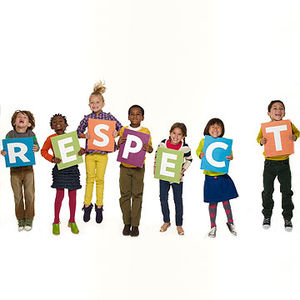
One of the biggest challenges modern parents face is instilling respect in their children. This isn’t an issue in which you can just tell your child, “Respect is important, so be respectful.” No, the development of respect in a child goes much deeper than words. Respect essentially means placing value in someone or something and responding in kind. When you value your friends, for example, you treat them kindly. When you value your local community, you keep it clean. Although respect is a concept that can be difficult to understand, it’s important to help your child learn to grasp what it means to be respectful. Because of this, it’s important that parents understand what it takes to help a child develop respect for other people, for themselves and for the world around them.
For some parents, respect isn’t an issue they consider until their child is well into their teenage years or going through a rebellious phase. Unfortunately, at this point, it’s almost too late to squash disrespect. Before your child begins going through hard times, make sure you start thinking about ways you can help them understand the value and the meaning of respect.
Demonstrate respect
Learn how to create a healthier, happier family that understands the importance of spending less time glued to their electronics and more time communicating and connecting.
Children learn most frequently through imitation. Your kids will learn to demonstrate and mimic your behavior early in life. If you treat the people around you with respect, your kids will pick up on that. If, however, you talk down to other people or ignore their opinions and insight, your children will choose those behaviors to imitate.
While no parent is perfect, make sure you spend some time considering what your behavior says about you. Are you argumentative? Are you rude? Are you pushy and mean? Do you go out of your way to help others? Do you clean up after yourself? Do you avoid littering? There are many ways you can demonstrate respect in everyday life, so don’t be afraid to ask yourself the hard questions about how you’re doing.
Talk about respect
Explain to your kids what respect is. Even from a young age, your children can explore the idea. This can be something as simple as talking about the importance of sharing toys or not taking something from another child. It could be more complex, like explaining why your child should be polite or kind to other people. When you open up the discussion on respect, your kids will feel more comfortable exploring this topic with you. Most importantly, they’ll be able to ask you questions about what it truly means to demonstrate respect to others.
Give real-life examples of respect
Make sure you give your child plenty of examples of what respect looks like. Many people grow up thinking they understand respect, yet they know little about the concept. Do your kids know what respect looks like? If they don’t, try to discuss real examples with them. You don’t have to make anything up. Just point out examples of respect and disrespect as you go about your day. Before you know it, they’ll understand exactly what you’re talking about.
Respond To Negative Behavior Consistently
Don’t overlook their negative behavior. Make sure you make them realize the consequences of their actions. Educate them and tell them how their mistakes can affect people adversely. Rectify them immediately and teach them not to repeat it.
Words
Children must be taught the value of words. Through examples in daily life, show them how words can hurt, anger or be disrespectful. Words should be used with care and caution, as once uttered they cannot be taken back. For instance, if your child is hurt because his playmate called him names, tell him that just as his friend's words hurt him, similarly his taunting could hurt his friend. If he wants his friend to behave well, he too must make the effort to be nice.
Actions
A child must be taught that his actions towards his peers or friends reveal instantly his deference to them. Even if an elder shouts at him, shouting back or hitting is not acceptable behaviour. Actions speak louder than words, goes the saying. So, if a child has been according respect to his teacher, but at the same time makes faces behind his back, the action speaks louder about his 'respect' towards his teacher.
Body Language
This is an oft forgotten aspect of parenting. Certain forms of body language remain with a person even in adulthood. Gestures like shrugging shoulders, various motions of hands or feet that children use today, are improper body language for a child, and show disrespect. Any such rude body language should be pointed out to the child at the first available opportunity.
While parenting is tough, it’s important that you face the hard issues head-on. Respect is one of those tough topics. Every parent wants what’s best for their child, so make sure you focus on developing respect early on. This will help prepare your child not only for survival in school but for flourishing in the workplace as well.
